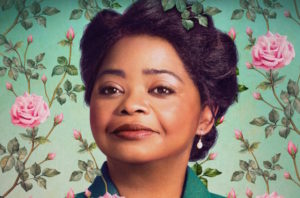Review: Self-Made
 When this miniseries premiered on Netflix on March 20, I was so excited to see it not just because it is the first modern biopic on the life of Madame C.J. Walker, but also I was so exhausted from watching coronavirus coverage on the news that I needed a break.
When this miniseries premiered on Netflix on March 20, I was so excited to see it not just because it is the first modern biopic on the life of Madame C.J. Walker, but also I was so exhausted from watching coronavirus coverage on the news that I needed a break.
From an entertainment perspective, it was a fun, escapist drama to temporarily take my mind off of what was going on in the real world. However, after a few days, I had time to re-evaluate what I saw. From a historical perspective, it is a horribly irresponsible movie.
The main issue I had with it was the depiction of the portrayal of Annie Malone whose name was changed to Addie Monroe. Malone was also a successful millionaire entrepreneur who built a whole hair and cosmetics empire for black women and supported local charities in St. Louis. For some reason, the film portrayed Addie Monroe as a bitter, jealous light-skinned woman steeped in colorism against the dark-skinned Walker.
Yes, the two women had a rivalry and colorism did exist during this time. But from all the history books and articles I have read about them, the two women fought over business issues and legal rights. I didn’t know much about Malone before watching this film. Walker didn’t steal the hair ointment idea from Malone in real life as portrayed in the movie.
I think it was sad that the film reduced the lives of these two great women from history to a low-class debate about light skin/dark skin. Is it really necessary to tear down one black woman just to build up another black woman?
You know I prefer historically accurate films, especially ones about black people, that are not sanitized. Madame C.J. Walker’s life was already very eventful, which could have been used in many ways in the film. Why was it necessary to create drama that didn’t exist? Unfortunately, most viewers will walk away from this film thinking that is how Malone was in real life. The film could have celebrated the lives of both of these women who overcame many obstacles during a time black women were not viewed as nothing more than domestics.